Opinion
The day the editor stood in the dock!

(With Contempt of Court cases making news recently, we publish today an article written by E.C.B. Wijeyesinghe, a famous journalist of yesteryear on the Contempt of Court case against the Editor of the Daily News in the nineteen thirties)
One of the occupational hazards of the editor of a newspaper is to suffer for other people’s sins. There is, of course, a sacred precedent for this kind of undeserved torture: but you cannot put up that plea in mitigation of the punishment when you stand face to face with the majesty of the law. In case you are eager to know what I am driving at, let me say at once that this is just a preamble to a story about an illustrious editor of the Ceylon Daily News who escaped by the skin of his teeth from spending a holiday in the Welikade Prison.
 His name is Herbert Hulugalle, who joined the ‘Daily News’ in 1918, when the paper was a toddler and helped the proprietor, D.R. Wijewardene for 30 years to tend it until it grew up to be a mighty giant. For 17 of these 30 years he was the Editor and made the newspaper the most powerful driving force towards Ceylon attaining political freedom. He severed his connection with journalism only after Ceylon became independent and then proceeded to shine in other fields. Hulugalle’s monumental work ‘The Life and Times of D.R. Wijewardene” is virtually the most authoritative and gripping narrative of perhaps the most exciting period of our history.
His name is Herbert Hulugalle, who joined the ‘Daily News’ in 1918, when the paper was a toddler and helped the proprietor, D.R. Wijewardene for 30 years to tend it until it grew up to be a mighty giant. For 17 of these 30 years he was the Editor and made the newspaper the most powerful driving force towards Ceylon attaining political freedom. He severed his connection with journalism only after Ceylon became independent and then proceeded to shine in other fields. Hulugalle’s monumental work ‘The Life and Times of D.R. Wijewardene” is virtually the most authoritative and gripping narrative of perhaps the most exciting period of our history.
BUSYBODY
The seed of the trouble in this case was eventually traced to some busybody in the Law Library, who wanted to ingratiate himself with Wijewardene by feeding him with what he thought was a juicy tit-bit. Forty years ago, as now, the Law Library was a sort of clearing house for gossip and the younger practitioners waiting for briefs revelled in stories which had the slightest odour of scandal. They gave flesh to the bare bones of the naughty rumour and embellished it in such a way that there was a big gap between the authorised version and the revised version that was circulated in the corridors of Hulftsdorp. The story that reached the ears of Wijewardene, however, lacked the usual salacious sauce. It was built up on a much more serious theme, namely, that the Supreme Court judges were giving themselves holidays to which they were not entitled. It was a report without any foundation whatsoever but it was good material for a powerful editorial.
TROUBLE
Wijewardene soon got going. He was not the man who allowed the grass to grow under his feet. The Lake House telephone bells started ringing, but the Editor, Herbert Hulugalle, happened to be away. Wijewardene got hold of the next best man in the office to give expression to his indignation. He happened to be J. L.Fernando, who for many years wrote the Parliamentary summary and the weekly political notes for the ‘Daily News.’ From the tone of the Chief’s voice, J. L. Fernando knew that something strong had to be written, and that, quickly. Fernando, who was an Oxford man, put his best foot forward and produced the stuff. To make matters worse from the legal point of view, he gave it the somewhat sarcastic but sinister title ‘Justice on Holiday.’ Then everybody went to bed, happy that the day’s good deed had been done.
TOO LATE
But the euphoria did not last long. At the bewitching hour of midnight something stirred. It was Wijewardene’s conscience. The Chief, whose journalistic instincts for self-preservation were highly developed felt there was something wrong somewhere. He went back to bed with an uneasy feeling, but woke up at half-past four in the morning when the offending sentences began to haunt him again and again. According to what the Boss told Hulugalle, his first impulse at dawn was to take up the telephone and have the editorial altered. But it was too late. Before the cocks began to crow Wijewardene was consulting his lawyer friends to prepare a defence. Shortly afterwards, the fat was in the fire. There in the dock stood the meek and mild Herbert Alexander Jayatilleke Hulugalle, the innocent victim of circumstances, perhaps paying the penalty for some sin he had committed in his previous birth. As the Editor of the ‘Daily News,’ he had to take the full responsibility for what appeared in his paper. He knew it, the proprietor knew it, the leader writer knew it and, above all, the Judges knew it.
FULL COURT
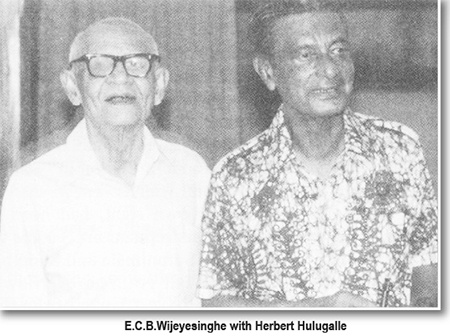 There he was, arraigned for Contempt of Court before a Full Court which is an awesome thing under any circumstances. All the King’s Counsel and all the King’s men, down to the humblest Fiscal’s peon, came to watch the show. In Hulftsdorp and the precincts it was like a Roman Holiday with a harmless Christian being thrown to the lions. The Court consisted of the Chief Justice, Sir Sydney Abrahams, Mr. Justice M.T. Akbar and Mr. Justice F.H.B Koch. Wijewardene retained two of the most eminent practitioners at the Bar to defend Hulugalle. They were R.L. Pereira, K.C, and H.V. Perera, K.C. A better combination could not be found. When the talking began, it became apparent that Sir Sydney Abrahams was riled, not only by the editorial, but by an affidavit for the defence prepared by the great E.J. Samerawickreme, K.C. himself. That affidavit was so ingeniously worded that it sought to make excuses for the editorial without making a full apology. That annoyed Sir Sydney a little more. For the fact of the matter was that there was no defence whatsoever for the offending article. The judges had merely taken a vacation to which they were fully entitled under the Courts Ordinance, which the busybody at the Law Library had misunderstood.
There he was, arraigned for Contempt of Court before a Full Court which is an awesome thing under any circumstances. All the King’s Counsel and all the King’s men, down to the humblest Fiscal’s peon, came to watch the show. In Hulftsdorp and the precincts it was like a Roman Holiday with a harmless Christian being thrown to the lions. The Court consisted of the Chief Justice, Sir Sydney Abrahams, Mr. Justice M.T. Akbar and Mr. Justice F.H.B Koch. Wijewardene retained two of the most eminent practitioners at the Bar to defend Hulugalle. They were R.L. Pereira, K.C, and H.V. Perera, K.C. A better combination could not be found. When the talking began, it became apparent that Sir Sydney Abrahams was riled, not only by the editorial, but by an affidavit for the defence prepared by the great E.J. Samerawickreme, K.C. himself. That affidavit was so ingeniously worded that it sought to make excuses for the editorial without making a full apology. That annoyed Sir Sydney a little more. For the fact of the matter was that there was no defence whatsoever for the offending article. The judges had merely taken a vacation to which they were fully entitled under the Courts Ordinance, which the busybody at the Law Library had misunderstood.
CHIEF ACTOR
Sir Sydney Abrahams, the principal actor in the drama, eventually became a member of the Judicial Committee of the Privy Council. He was Chief Justice of Ceylon for three years from 1936 to 1939. Of Jewish extraction, he was one of a trio of brilliant brothers, all of whom excelled at Cambridge in studies as well as in athletics. Before he came to Ceylon he was Chief Justice both in Uganda as well as Tanganyika. As an athlete, he represented Cambridge against Oxford in the long jump and 100 yards for three years, and then went on to be chosen as the British representative in the Olympic Games at Athens and Stockholm. He was the World’s Amateur Long Jump Champion in 1913. An athlete of that calibre had never before adorned the Supreme Court bench of Ceylon and he was generally regarded not only as a great sportsman but as a good sport. But even sportsmen lose their temper when for no valid reason, people try to be funny at the expense of the highest tribunal in the land. All the judicial lions, however, were not in the mood to devour their victim, but their leader could not be restrained because the highest court in the land had been held up to ridicule on baseless grounds. It was the title of the editorial, ‘Justice on Holiday,’ that hurt more than the contents.
CONCESSION
As a mild concession to the “Daily News” which then took pride in describing itself as the watch-dog of the nation, the accused was unleashed for the moment and allowed to sit behind his defenders, which he did biting only his own nails or what was left of them. Money was of no consequence to Wijewardene when it came to a fight. He was always ready to do battle for the freedom of the Press and stand up for his staff. In this instance, however, he knew he was on a sticky wicket. Hulugalle was sentenced, without much demur, to pay a fine of Rs. 1000 and to “imprisonment till the rising of the Court.” The fine was paid promptly because Wijewardene had sent one of his two trusted men, P.C.A.Nelson or E.E.C. Abayasekera, (I forget which one), with a large bundle of currency notes to cover ten times the prescribed punishment, in case it was only a fine.
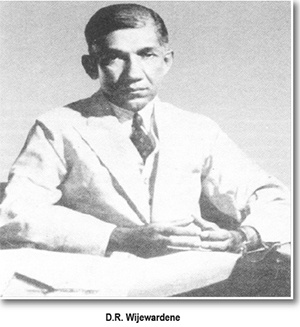 But the fly in the ointment was the second part of the sentence. Imprisonment is imprisonment, whether it is till the rising of the Court or the arrival of Doomsday. Wijewardene’s strategy was now confined to finding a face-saving device. He decided to appeal to the Privy Council in London and retained Gavin Turnbull Simonds K.C. with Hugh Imbert Hallett, K.C. as junior. On the very day that the appeal came up Simonds was made a judge of the Chancery Division of the High Court. This was just a stepping stone of the Lord High Chancellorship of Britain. Hugh Hallett, K,C, also rose to be a High Court Judge, Queen’s Bench Division. All of which goes to show, that as in Ceylon, the best legal brains in England were harnessed to save Hulugalle. But alas, Justice was not on holiday even in the Privy Council and the appeal was dismissed. When the record of the case came back to Ceylon, Hulugalle was hauled out of his editorial seat once more in order to serve his sentence.
But the fly in the ointment was the second part of the sentence. Imprisonment is imprisonment, whether it is till the rising of the Court or the arrival of Doomsday. Wijewardene’s strategy was now confined to finding a face-saving device. He decided to appeal to the Privy Council in London and retained Gavin Turnbull Simonds K.C. with Hugh Imbert Hallett, K.C. as junior. On the very day that the appeal came up Simonds was made a judge of the Chancery Division of the High Court. This was just a stepping stone of the Lord High Chancellorship of Britain. Hugh Hallett, K,C, also rose to be a High Court Judge, Queen’s Bench Division. All of which goes to show, that as in Ceylon, the best legal brains in England were harnessed to save Hulugalle. But alas, Justice was not on holiday even in the Privy Council and the appeal was dismissed. When the record of the case came back to Ceylon, Hulugalle was hauled out of his editorial seat once more in order to serve his sentence.
Luckily for him, he still possessed the black coat and striped pants in which he had taken his oaths as an advocate. Shaking off the moth-balls from these garments which he had not worn for fifteen years, Hulugalle slipped into the Supreme Court like a thief in the night, to take his punishment. Those who recognised him, wondered what he was doing in this strange attire. He sat among the advocates, poring over a New Law Report, but all the while serving his sentence till the rising of the Court. At the lunch interval the Registrar of the Supreme Court, Guy O. Grenier, an old friend, virtually took Hulugalle by the hand and led him to his sanctum where they shared Grenier’s sandwiches. Back in Court, Mr. Justice Poyser, the presiding judge, who had a keen sense of humour now seemed to be aware of the comedy of Hulugalle’s incarceration, as the accused was slipping in and out of chairs and pretending to be deeply absorbed in law books which he had not touched since he left the Law College, where Mr. Justice Akbar was one of his teachers. Poyser rose to the occasion. For some unknown reason he adjourned the Court much earlier than usual indicating the fall of the curtain on the case.
Poyser bowed to Hulugalle, Hulugalle bowed to Grenier and Grenier bowed to the Counsel, while the Court Crier shouted himself hoarse in a tone suggesting that justice will be done though the heavens fall. Hulugalle quietly proceeded to Lake House, where he received a warm welcome from his colleagues, but better still a substantial cheque from his Boss to compensate him not only for his pain of mind, but for the fine performance he had put up as an actor.
(From “The Good at their Best” Selected writings of E.C.B.Wijeyesinghe, Actor and Journalist)
- News Advertiesment
See Kapruka’s top selling online shopping categories such as Toys, Grocery, Flowers, Birthday Cakes, Fruits, Chocolates, Clothing and Electronics. Also see Kapruka’s unique online services such as Money Remittence,News, Courier/Delivery, Food Delivery and over 700 top brands. Also get products from Amazon & Ebay via Kapruka Gloabal Shop into Sri Lanka.
Opinion
Take Human Rights seriously, not so much the council or office
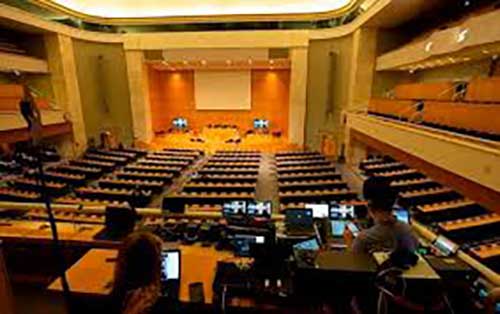
By Dr Laksiri Fernando
The 46th Session of the UN Human Rights Council started on 22 February morning with obvious hiccups. The Office, to mean the Office of the UN High Commissioner for Human Rights, finally decided to hold all sessions virtually online, only the President of the Council and the assistants in the high table sitting at the UN Assembly Hall in Geneva. The President, Ms. Nazhat Shammen Khan, Ambassador from Fiji in Geneva, wearing a saree, was graceful in the chair with empty seats surrounding.
In the opening session, the UN General Assembly President, UN General Secretary, UN High Commissioner for Human Rights, and Head of Foreign Affairs, Switzerland (as the host country), addressed remotely the session. In fact, there was no need for Switzerland to have a special place, as the UN is independent from any host country. Switzerland is fairly ok, however, if this tradition is followed, the UN General Assembly may have to give a special place to the US in New York.
Initial Addresses
UN General Secretary, Antonio Guterres’ address could have been quite exemplary if he gave a proper balance to the developed and developing countries. He talked about racism and fight against racism but did not mention where racism is overwhelmingly rampant (US and Europe) and what to do about it. Outlining the human rights implications of Covid-19 pandemic, he made quite a good analysis. It was nice for him to say, ‘human rights are our blood line (equality), our lifeline (for peace) and our frontline (to fight against violations).’ However, in the fight against violations, he apparently forgot about the ‘blood line’ or the ‘lifeline’ quite necessary not to aggravate situations through partiality and bias. He never talked about the importance of human rights education or promoting human rights awareness in all countries.
His final assault was on Myanmar. Although he did not call ‘genocide,’ he denounced the treatment of Rohingyas as ethnic cleansing without mentioning any terrorist group/s within. His call for the release of Aung San Suu Kyi and other civilian leaders undoubtedly should be a common call of all. However, he did not leave any opening for a dialogue with the military leaders or bring back a dialogue between Aung San and Min Aung, the military leader. With a proper mediation, it is not impossible. Calling for a complete overhaul as the young demonstrators idealistically claim might not be realistic.
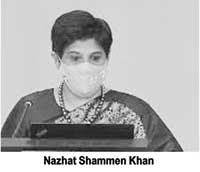 High Commissioner Michelle Bachelet’s address was brief and uncontroversial this time without mentioning any country or region. It is clear by now perhaps she is not the real author of the Report against Sri Lanka, but someone probably hired by the so-called core-group led by Britain. Her major points were related to the coronavirus pandemic trying to highlight some of the socio-economic disparities and imbalances of policy making that have emerged as a result. The neglect of women, minorities, and the marginalized sections of society were emphasized. But the poor was not mentioned. As a former medical doctor, she also opted to highlight some of the medical issues underpinning the crisis.
High Commissioner Michelle Bachelet’s address was brief and uncontroversial this time without mentioning any country or region. It is clear by now perhaps she is not the real author of the Report against Sri Lanka, but someone probably hired by the so-called core-group led by Britain. Her major points were related to the coronavirus pandemic trying to highlight some of the socio-economic disparities and imbalances of policy making that have emerged as a result. The neglect of women, minorities, and the marginalized sections of society were emphasized. But the poor was not mentioned. As a former medical doctor, she also opted to highlight some of the medical issues underpinning the crisis.
Then came the statements from different countries in the first meeting in the following order: Uzbekistan, Colombia, Lithuania, Afghanistan, Poland, Venezuela, Finland, Fiji, Moldova, Georgia, Kazakhstan, Equatorial Guinea, Vietnam, Belgium, and Morocco. The obvious purposes of these statements were different. Some countries were apparently canvassing for getting into the Human Rights Council at the next turn perhaps for the purpose of prestige. Some others were playing regional politics against their perceived enemies. This was very clear when Lithuania and Poland started attacking Russia.
But there were very sincere human rights presentations as well. One was the statement by the President of Afghanistan, Mohammad Ashraf Ghani. He outlined the devastating effects that Afghanistan had to undergo during the last 40 years, because of foreign interferences. The initial support to Taliban by big powers was hinted. His kind appeal was to the UN was to go ‘beyond discourse to practice’ giving equal chance to the poor and the developing countries to involve without discrimination.
Controversial Presentations
China’s Foreign Affairs Minister, Wang Yi, made his presentation almost at the end of the first day. This is apparently the first time that China had directly addressed the Human Rights Council. Beginning with outlining the devastating repercussions of the coronavirus pandemic he stressed that the world should face the challenges through ‘solidarity and cooperation.’ He broadened the concept to human rights solidarity and cooperation. His expressed views were quite different to the others, particularly to the Western ones.
He frankly said that what he expresses are the views of China on human rights without claiming those are absolute truths or forcing others to believe or implement them. There were four main concepts that he put forward before the member countries. First, he said, “We should embrace a human rights philosophy that centres on the people. The people’s interests are where the human rights cause starts and ends.” Second, he said, “we should uphold both universality and particularity of human rights. Peace, development, equity, justice, democracy, and freedom are common values shared by all humanity and recognized by all countries.” “On the other hand,” he said, “countries must promote and protect human rights in light of their national realities and the needs of their people.”
“Third,” he said, “we should systemically advance all aspects of human rights. Human rights are an all-encompassing concept. They include civil and political rights as well as economic, social, and cultural rights.” He then emphasized, “Among them, the rights to subsistence and development are the basic human rights of paramount importance.” Fourth, “we should continue to promote international dialogue and cooperation on human rights. Global human rights governance should be advanced through consultation among all countries.”
It was on the same first day before China, that the United Kingdom launched its barrage against several countries not sparing Sri Lanka. The Foreign Secretary, Dominic Raab, delivered the statement from top to bottom attacking alleged violating countries on human rights. But there was no mentioning of Israel for the repression of Palestinians or the systemic racism rampaging in the United States, including the 6 January attacks on the Capitol by extremist/terrorist groups.
His first sermon was on Myanmar without acknowledging the British atrocities or mismanagement of this poor and diverse country during the colonial period. He was quite jubilant over implementing sanctions and other restrictions over the country. Many sanctions, in my opinion, are extortions. Undoubtedly, Aung San Suu Kyi and other leaders should be released, and democracy restored. This is a task of the whole council and when one or two countries try to grab the credit, there can be obvious reservations of others.
His further scathing attacks were against Belarus, Russia, and China. Some appeared factually correct but not necessarily the approach or the motives genuine. The following is the way he came around Sri Lanka. He said,
“Finally, we will continue to lead action in this Council: on Syria, as we do at each session; on South Sudan; and on Sri Lanka, where we will present a new resolution to maintain the focus on reconciliation and on accountability.”
‘Action’ to him basically means repeatedly passing resolutions, of course imposing economic and other sanctions. He said, “as we do at each session”; like bullying poor or weak countries at each session. Can there be a resolution against Russia or China? I doubt it.
What would be the purpose of presenting a resolution against Sri Lanka? As he said, “to maintain the focus on reconciliation and on accountability.” This will satisfy neither the Tamil militants nor the Sinhalese masses. But it might satisfy the crafty Opposition (proxy of the defeated last government). This is not going to be based on any of the actual measures that Sri Lanka has taken or not taken on reconciliation or accountability. But based on the ‘Authoritarian and Hypocritical Report’ that some anti-Sri Lankans have drafted within the Office of the High Commissioner for Human Rights. This what I have discussed in my last article.
In this context, successful or not, the statement made by the Sri Lanka’s Minister of External Affairs, Dinesh Gunawardena, in rejecting any resolution based on the foxy Report of the Office of the UN High Commissioner for Human Rights, in my concerned opinion, is absolutely correct.
Opinion
President’s energy directives ignored by the Power Ministry: Another Point of View

Dr Tilak Siyambalapitiya
Dr Janaka Rathnasiri laments (The Island 19 Feb 2021) that the Power Ministry has ignored the President’s directive to draw 70% of energy from renewable sources by 2030. I saw the approved costs of electricity production for 2019, published by the Public Utilities Commission (PUCSL).
PUCSL has also approved the prices to sell electricity to customers. Although various customers pay at various “approved” prices, the average income from such “approved” prices in 2019 was Rs 17.02 per unit. It is not only the Ministry, according to Dr Rathnasiri, ignoring the President; PUCSL is also breaking the law, which says prices and approved costs should be equal.
 So there is already an illegal gap of Rs 21.59 minus 17.02 = Rs 4.57 per unit of electricity sold. If electricity prices are not to be increased, as stated by many in the government and PUCSL, let us say the following: Distribution costs should decrease by 0.57 Rs per unit. Generation costs should decrease by Rs 4.00 per unit.
So there is already an illegal gap of Rs 21.59 minus 17.02 = Rs 4.57 per unit of electricity sold. If electricity prices are not to be increased, as stated by many in the government and PUCSL, let us say the following: Distribution costs should decrease by 0.57 Rs per unit. Generation costs should decrease by Rs 4.00 per unit.
PUCSL also published the approved cost of purchasing or producing electricity from various sources for 2019. The actual energy values were different to what was approved, but let us stick to PUCSL approved figures:
I suggest Dr Rathnasiri fills-up the following table, to show how much electricity will cost in 2030 to produce and deliver, if the President’s 70% target is to be achieved and for PUCSL to abide by the law. Let us assume that electricity requirement in 2030 will be double that of 2019.
 Since PUCSL has to save Rs 4 from 13.92, the average selling price for energy should be Rs 13.92 minus 4.00 = Rs 9.92. With a target network loss of 7% (in 2019 it was 8.4%), the average cost of production has to be Rs 9.27 per unit. Eight cages have to be filled-up by Dr Rathnasiri.
Since PUCSL has to save Rs 4 from 13.92, the average selling price for energy should be Rs 13.92 minus 4.00 = Rs 9.92. With a target network loss of 7% (in 2019 it was 8.4%), the average cost of production has to be Rs 9.27 per unit. Eight cages have to be filled-up by Dr Rathnasiri.
In 2012, PUCSL approved the energy cost of electricity produced from coal power to be 6.33 Rs per kWh. In 2019, PUCSL approved 9.89 (56% increase). For renewable energy, it was 13.69 in 2012, and 19.24 in 2019 (a 40% increase, but double the price of electricity from coal fired generation). In 2012, rooftop solar was not paid for: only give and take, but now paid Rs 22, against Rs 9.89 from coal. There seems to be something wrong. The price reductions of renewable energy being promised, being insulated from rupee depreciation, are not happening? Either Sri Lanka must be paying too little for coal, or it may be renewable energy is severely over-priced?
On coal we hear only of some corruption every now and then; so Sri Lanka cannot be paying less than it costs, for coal.
Enough money even to donate
vaccines
 Another reason for the Ministry of Power to ignore the President’s directive may be the Ministry’s previous experience with similar Presidential directives. In 2015, the President at that time cancelled the Sampur coal-fired power plant, and the Ministry faithfully obliged. That President and that Prime Minister then played ball games with more power plants until they were thrown out of power, leaving a two-billion-dollar deficit (still increasing) in the power sector. Not a single power plant of any description was built.
Another reason for the Ministry of Power to ignore the President’s directive may be the Ministry’s previous experience with similar Presidential directives. In 2015, the President at that time cancelled the Sampur coal-fired power plant, and the Ministry faithfully obliged. That President and that Prime Minister then played ball games with more power plants until they were thrown out of power, leaving a two-billion-dollar deficit (still increasing) in the power sector. Not a single power plant of any description was built.
Where is this deficit? You do not have to look far. In the second table, replace 24.43 with 9.89, to reflect what would have happened if Sampur was allowed to be built. The value 12.79 will go down to 8.55, well below the target of Rs 9.27 per unit to produce. Not only would CEB and LECO report profits, but the government too could have asked for an overdraft from CEB to tide over any cash shortfalls in the treasury. All this with no increase in customer prices. Producers of electricity from renewable energy could enjoy the price of 19.24 Rs per unit. And that blooming thing on your rooftop can continue to enjoy Rs 22 per unit. The Minister of Power, whom Dr Rathnasiri wants to replace with an army officer, would have been the happiest.
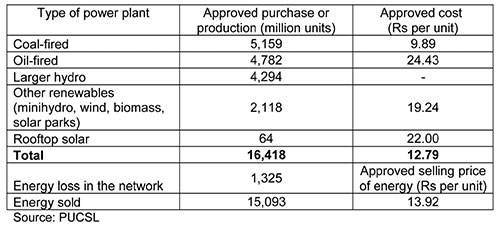 In the absence of Sampur (PUCSL’s letter signed by Chairman Saliya Mathew confirmed cancellation and asked CEB not to build it), PUCSL approved electricity to be produced at Rs 21.59 and sold at Rs 17.02 per unit. The annual loss would be Rs (21.59 – 17.02) x 15,093 = Rs 69 billion per year of approved financial loss. Sri Lanka has a Telecom regulator, an Insurance regulator, a Banking regulator, who never approve prices below costs. Sometime ago the telecom regulator asked the operators to raise the prices, when operators were proposing to reduce prices amidst a price war. But the electricity industry regulator is different: he approves costs amounting to 27% more than the price, not just once but, but continuously for ten long years !
In the absence of Sampur (PUCSL’s letter signed by Chairman Saliya Mathew confirmed cancellation and asked CEB not to build it), PUCSL approved electricity to be produced at Rs 21.59 and sold at Rs 17.02 per unit. The annual loss would be Rs (21.59 – 17.02) x 15,093 = Rs 69 billion per year of approved financial loss. Sri Lanka has a Telecom regulator, an Insurance regulator, a Banking regulator, who never approve prices below costs. Sometime ago the telecom regulator asked the operators to raise the prices, when operators were proposing to reduce prices amidst a price war. But the electricity industry regulator is different: he approves costs amounting to 27% more than the price, not just once but, but continuously for ten long years !
That is 370 million dollars per year as of 2019, the economy is spending, and for years to come, to burn oil (and say we have saved the environment). Did the Minister of Health say we are short of 160 million dollars to buy 40 million doses of the vaccine? Well, being a former Minister of Power, she now knows which Presidential “order” of 2015 is bleeding the economy of 370 million dollars per year, adequate to buy all vaccines and donate an equal amount to a needy country.
Prices are the production costs approved by PUCSL for 2019. The selling price approved by the same PUCSL was Rs 9.27 per unit.
Opinion
Confusion on NGOs and NSOs in Sri Lanka

If you listen to politicians and journalists here, you will hear of that curious creature rajya novana sanvidane, a Non-State Organization (NSO). Where do you get them? In the uninstructed and dead minds of those who use those terms. In the real world, where politicians and journalists have developed minds, there are Non-Governmental Organizations (NGO). The United Nations is an organization set up by state parties, not by governments. It is true that agents of states, governments, make the United Nations work or fail. Governments may change but not the states, except rarely. When Eritrea broke away from Ethiopia, a new state was formed and was so recognised by the United Nations. However, the LTTE that tried to set up another state was crushed by the established state that it tried to break away from, and the UN had nothing to do with them.
This entirely unnecessary confusion, created out of ignorance, is so destructive that organizations completely loyal to the existing state, are made to be traitorous outfits, for they are ‘non-state organizations’ within the state. There are citizens of each state, but no citizens of any government. Government is but an instrument of the state. In most states there are organizations, neither of the state nor of government: religious organizations including churches. But none of them is beyond the pale of the state.
Those that speak of rajya novana sanvidane give that name partly because they have no idea of the origin of non-governmental organizations. NGOs came into the limelight, as donor agencies, noticed that some governments, in East Africa, in particular, did not have the capacity and the integrity to use the resources that they provided. They construed, about 1970, that NGOs would be a solution to the problem. Little did they realize that some NGOs themselves would become dens of thieves and brigands. I have not seen any evaluation of the performance of NGOs in any country. There was an incomplete essay written by Dr. Susantha Gunatilleka. NGOs are alternatives to the government, not to the state.
Our Constitution emphatically draws a distinction between the government and state, and lays down that the President is both Head of Government and Head of State (Read Article 2 and Article 30 of the Constitution.) It is as head of state that, he/she is the Commander of the Armed Forces, appoints and receives ambassadors and addresses Parliament annually, when a prorogued Parliament, reconvenes. He/she presides over the Cabinet as head of government. The distinction is most clear, in practice, in Britain where Queen Elizabeth is the head of state and Boris Johnson is the Prime Minister and head of government. However, in principle, Johnson is the Queen’s First Minister appointed by the sovereign, and resigns by advising her of his decision to do so.
In the US and in India the term ‘state’ has special significance. In India there is a ‘rajya sabha’ (the Council of States) whose members represent constituent States and Union Territories. Pretty much the same is true of the United States. In the US, executive power is vested in the President and heads the administration, government in our parlance. The Head of State does not come into the Constitution but those functions that one associates with a head of state are in the US performed by the President of the Republic. The US President does not speak of my state (mage rajaya) but of my administration, (mage anduva). Annually, he addresses Congress on the State of the Union. Our present President must be entirely familiar with all this, having lived there as a citizen of the US for over a decade. It is baffling when someone speaks of a past state as a traitor to that same state. It is probable that a government was a traitor to the state. ‘Treason against the United States, shall consist only in levying war against them, or in adhering to their (States’) enemies, giving them aid and comfort’. That a state was a traitor to the same state is gobbledygook.
Apart from probable confusion that we spoke of in the previous paragraph, it is probable that a president and other members of a government, including members of the governing party here, find it grandiloquent to speak of his/her/their state (mage/ape rajaya), rather than my government (mage anduva) or Sirisena anduva’ and not Sirisena state; it was common to talk of ‘ape anduva’ in 1956; politicians in 1956 were far more literate then than they are now.
When translating from another language, make sure that you understand a bit of the history of the concept that you translate. A public school in the US is not the same as a public school in the UK.
MAHADENAMUTTA









